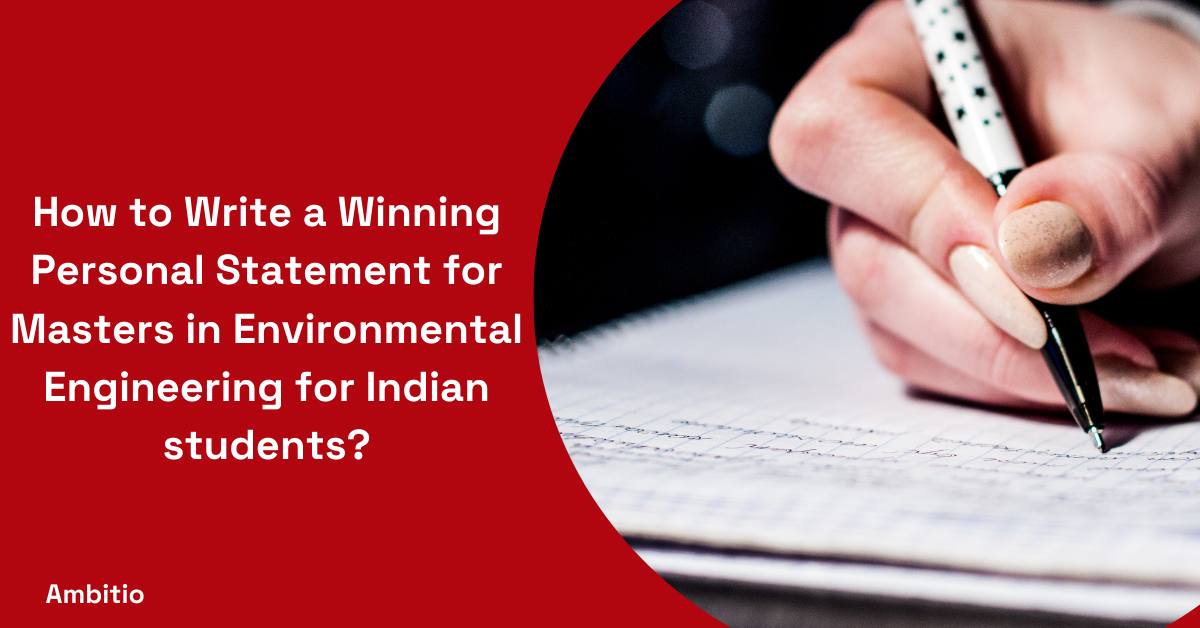24 April 2025
5 minutes read
How to Write a Winning Personal Statement for Masters in Environmental Engineering for Indian students?

Key Takeaways:
- Personal statement for masters in environmental engineering should reflect your passion for sustainability and address global challenges like water security and green energy.
- Focus on hands-on experience, academic and professional alignment, and clear impact-driven goals in your statement.
- Top universities like Stanford and MIT offer strong programs, with competitive fees and high post-graduation salaries.
Over 70% of Indian students get rejected from top grad schools, not because of poor grades, but because their personal statement for masters in environmental engineering lacks clarity, purpose, and depth. The admissions committee isn’t just evaluating your academic background; they’re hunting for your motivation, your ambition, and how your story aligns with real-world environmental issues like waste management, clean air, and renewable energy.
Most applicants copy generic personal statement examples or talk vaguely about their interest in environmental work. But you? You can stand out. By connecting your undergraduate achievements with your professional goals and showing true initiative for sustainable engineering, your statement can become a powerful personal narrative.
Why Your Environmental Engineering Personal Statement Matters More Than You Think?
Your personal statement for masters in environmental engineering, Indian students is not just a formality, it’s the single most powerful part of your graduate school application. While your undergraduate degree and scores show your ability to perform academically, the statement of purpose tells the admissions committee who you are, why you want to pursue a master’s degree, and how your aspiration aligns with real environmental impact. It’s your one shot to stand out among thousands of applicants from civil engineering or postgraduate backgrounds.

In today’s world of inefficient energy sources, irresponsible waste disposal, and loss of biodiversity, schools aren’t just looking for marks, they’re looking for motivation behind your desire to pursue a degree that tackles these pressing issues. Your environmental engineering personal statement example should reflect hands-on experience, life experiences, technical reports, and leadership skills to prove you’re ready to implement solutions that ensure food and water security and help develop agricultural practices that ensure food security for every single person. A strong statement shows your expertise in environmental engineering, your drive for sustainability, and your passion to consider environmental engineering as a lifelong mission, not just a course.
Key Elements of a Strong Personal Statement for Masters in Environmental Engineering
Crafting a compelling personal statement for masters in environmental engineering, Indian students isn’t just about listing achievements, it’s about aligning your academic and professional journey with your passion for creating a sustainable world. Your statement should reflect why you want a degree in environmental engineering, how you’ll contribute to future generations, and what makes your application process stand out in competitive graduate programs.

It should be concise, deeply personal, and forward-thinking, especially when it comes to challenges like water security for every single person or natural resource cultivation. Here are the key elements your statement must include:
- Clear Motivation and Enthusiasm: Show you’re genuinely enthusiastic about environmental challenges like ecosystem remediation, environmental control, and green energy solutions.
- Academic and Professional Alignment: Tie in your higher education goals and specialization interests with past experiences and future ambitions.
- Impact-Driven Goals: Highlight how your work can impact future generations, such as improving water security or promoting sustainable cultivation practices.
- Concise, Structured Writing: Keep it tight and purposeful. Admissions teams read hundreds of statements, don’t submit another generic PDF.
- Value-Add to the Program: Mention how you plan to contribute to the program, using hands-on insights and a strong desire to advance environmental engineering globally.
5 Tips to Make Your Personal Statement Stand Out
Writing a personal statement for masters in environmental engineering, Indian students can be a daunting task, but with the right approach, it can become the most powerful part of your application.
Admissions committees are looking for students who not only have academic excellence but also a clear, passionate vision for tackling real-world environmental issues. Here are five tips to help you make your statement truly fulfilling and impactful:
- Be Authentic: Your personal statement for masters in environmental engineering, Indian students should reflect your genuine passion for sustainable engineering and a fulfilling career.
- Showcase Real Impact: Focus on how you aim to tackle real-world challenges like water security for every single person or ecosystem remediation.
- Highlight Hands-On Experience: Include specific examples of your academic and professional achievements that align with your goals.
- Be Concise: Avoid unnecessary fluff. Keep your statement clear, structured, and to the point to make it memorable.
- Link Your Goals to the Program: Clearly explain how the program will help you achieve your aspirations in green energy and environmental control.
10 Top Universities to Study Masters in Environmental Engineering for Indian Students
A Master’s in Environmental Engineering is an excellent choice for students passionate about sustainability, climate change, and global environmental challenges. With increasing demand for solutions to problems like water security, natural resource cultivation, and green energy, environmental engineers are crucial in tackling these pressing issues.
Here are the top universities offering a degree in environmental engineering and the key details for Indian students.
| University | Average Tuition Fees (Annual) | Average Salary (Post-Graduation) | Exams Required |
|---|---|---|---|
| Stanford University | $50,000 – $60,000 | $80,000 – $95,000 | GRE, TOEFL/IELTS |
| Massachusetts Institute of Technology (MIT) | $45,000 – $55,000 | $75,000 – $90,000 | GRE, TOEFL/IELTS |
| University of California, Berkeley | $40,000 – $50,000 | $70,000 – $85,000 | GRE, TOEFL/IELTS |
| University of Cambridge | £25,000 – £35,000 | £50,000 – £65,000 | GRE, IELTS |
| ETH Zurich | CHF 1,000 (per semester) | CHF 80,000 – CHF 95,000 | GRE, IELTS/TOEFL |
| Tsinghua University | ¥40,000 – ¥55,000 | ¥250,000 – ¥350,000 | GRE, TOEFL/IELTS |
| University of Melbourne | AUD 40,000 – AUD 50,000 | AUD 70,000 – AUD 85,000 | GRE, IELTS |
| University of Sydney | AUD 40,000 – AUD 45,000 | AUD 65,000 – AUD 75,000 | GRE, IELTS/TOEFL |
| University of Toronto | CAD 30,000 – CAD 45,000 | CAD 65,000 – CAD 80,000 | GRE, TOEFL/IELTS |
| Imperial College London | £30,000 – £40,000 | £55,000 – £70,000 | GRE, IELTS |
Conclusion
Writing a compelling personal statement for masters in environmental engineering is crucial for Indian students aiming to pursue a degree that addresses global environmental challenges. Your statement should reflect your passion for sustainability, showcase relevant academic and professional experiences, and clearly demonstrate how the program aligns with your long-term goals. By focusing on real-world issues like water security and green energy, you can create a statement that stands out.
Ready to take the next step? Let Ambitio guide you through the application process and help you craft the perfect personal statement for your success.
FAQs
What is the difference between a Statement of Purpose and a Personal Statement?
A Statement of Purpose emphasizes academic and professional goals, while a Personal Statement focuses on your background, motivations, and personal journey.
What should I include in my Personal Statement for Environmental Engineering?
Include your motivation for the field, relevant experiences, academic achievements, and how your background prepares you for the program.
How long should the Personal Statement be?
It should typically be one to two pages, or as specified by the university.
How personal should my Personal Statement be?
It should be personal enough to share your unique story and motivations, but remain professional and relevant to environmental engineering.
Should I mention specific faculty or research interests?
Yes, mentioning faculty or research that aligns with your interests shows you have researched the program and know how you fit in.
What common mistakes should I avoid in my Personal Statement?
Avoid clichés, generic statements, repeating your resume, and irrelevant details; focus on experiences and skills relevant to environmental engineering.
Do I need an undergraduate degree in environmental engineering to apply?
No, degrees in related fields like engineering, physical sciences, or biological sciences are usually accepted if you have the necessary background.

You can study at top universities worldwide!
Get expert tips and tricks to get into top universities with a free expert session.
Book Your Free 30-Minute Session Now! Book a call now




























